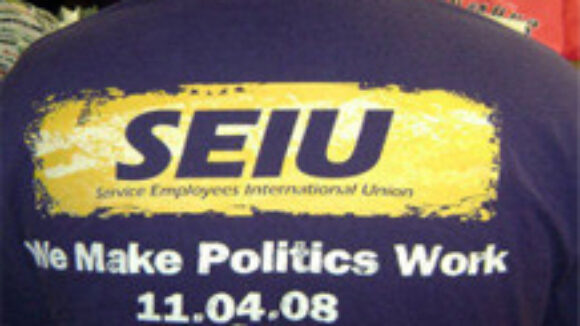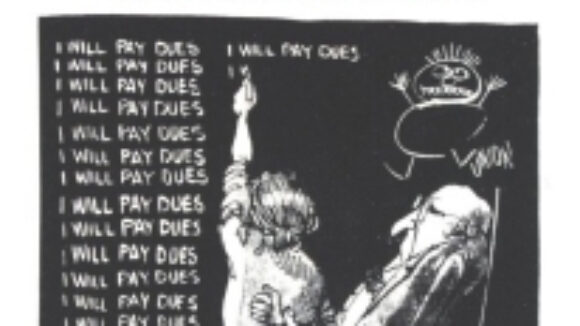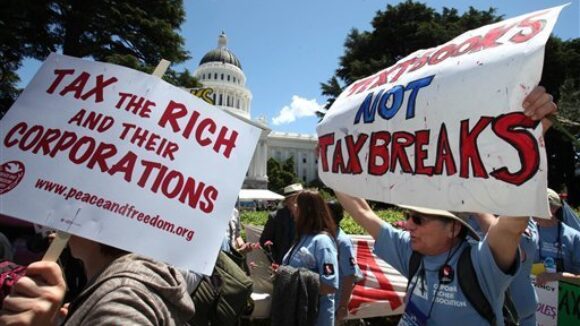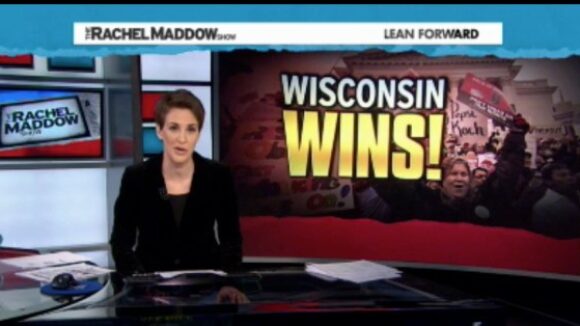Villaraigosa Under SEIU Attack
It’s hard to believe that the Democratic National Convention will go off without a snag. The selection of North Carolina — a Right to Work state — did not go over…

It’s hard to believe that the Democratic National Convention will go off without a snag. The selection of North Carolina — a Right to Work state — did not go over…

Thanks to union rules, California’s “Teacher of the Year” now has another title — “unemployed”: A California woman who was named her school district’s “Teacher of the Year” has a new title — “job seeker.” The district laid off…
From Reason: The latest Reason-Rupe poll of 708 Wisconsin adults on landline and cell phones suggests Wisconsin voters favor reforming public employee unions, over raising taxes and…
You know the union bosses' spending and benefits orgy is coming to an end when liberals like Fareed Zakaria of Time Magazine recognize the dangers unfunded pensions that union activists and pro-big labor politicians have created: "A day after Governor Scott Walker won his recall election, the New York Times wrote, "The biggest political lesson from Wisconsin may be that the overwhelming dominance of money on the Republican side will continue to haunt Democrats." Democrats have drawn much the same conclusion. "You've got a handful of self-interested billionaires who are trying to leverage their money across the country," said David Axelrod, Barack Obama's senior campaign strategist. "Does that concern me? Of course that concerns me." Warren Buffett calls the costs of public-sector retirees a "time bomb." They are the single biggest threat to the U.S.'s fiscal health. If the U.S. is going to face a Greek-style crisis, it will not be at the federal level but rather with state and local governments. The numbers are staggering. In California, total pension liabilities--the money the state is legally required to pay its public-sector retirees--are 30 times its annual budget deficit. Annual pension costs rose by 2,000% from 1999 to 2009. In Illinois, they are already 15% of general revenue and growing. Ohio's pension liabilities are now 35% of the state's entire GDP.
You know the union bosses' spending and benefits orgy is coming to an end when liberals like Fareed Zakaria of Time Magazine recognize the dangers unfunded pensions that union activists and pro-big labor politicians have created: "A day after Governor Scott Walker won his recall election, the New York Times wrote, "The biggest political lesson from Wisconsin may be that the overwhelming dominance of money on the Republican side will continue to haunt Democrats." Democrats have drawn much the same conclusion. "You've got a handful of self-interested billionaires who are trying to leverage their money across the country," said David Axelrod, Barack Obama's senior campaign strategist. "Does that concern me? Of course that concerns me." Warren Buffett calls the costs of public-sector retirees a "time bomb." They are the single biggest threat to the U.S.'s fiscal health. If the U.S. is going to face a Greek-style crisis, it will not be at the federal level but rather with state and local governments. The numbers are staggering. In California, total pension liabilities--the money the state is legally required to pay its public-sector retirees--are 30 times its annual budget deficit. Annual pension costs rose by 2,000% from 1999 to 2009. In Illinois, they are already 15% of general revenue and growing. Ohio's pension liabilities are now 35% of the state's entire GDP.

California is a long ways off from becoming a Right to Work state as the union bosses hold incredible sway over elected officials throughout the state. But Forbes' Joel Kotkin argues a new reform wind is blowing that threatens the old way of doing business: As with the old party bosses in Russia, [Jerry] Brown’s distinct lack of courage has only worsened California’s lurch toward fiscal and economic disaster. Yet as the budget woes worsen, other Californians, including some Democrats, are beginning to recognize the need for perestroika in the Golden State. This was most evident in the overwhelming vote last week in two key cities, San Diego and San Jose, to reform public employee pensions, a huge reversal after decades of ever more expansive public union power in the state. California’s “progressive” approach has been enshrined in what is essentially a one-party state that is almost Soviet in its rigidity and inability to adapt to changing conditions. With conservatives, most businesses and taxpayer advocates marginalized, California politics has become the plaything of three powerful interest groups: public-sector unions, the Bay Area/Silicon Valley elite and the greens. Their agendas, largely unrestrained by serious opposition, have brought this great state to its knees. California’s ruling troika has been melded by a combination of self-interest and a common ideology. Their ruling tenets center on support for an ever more intrusive, and expensive, state apparatus; the need to turn California into an Ecotopian green state; and a shared belief that the “genius” of Silicon Valley can pay for all of this. Now this world view is foundering on the rocks of economic reality. Californians suffer from a combination of high taxes and intrusive regulation coupled with a miserable education system — the state’s students now rank 47th in science achievement — and a rapidly deteriorating infrastructure.
Teacher's in Chicago, Illinois have voted to authorize a strike over their demand for a 30% pay increase (funded by the taxpayers) and smaller classroom sizes. The union wants a two-year deal that reduces class size and calls for teachers to receive a 24 percent pay raise in the first year and a 5 percent pay raise in the second year. The strike would start at the beginning of the next school year should the union not come to terms with Mayor Rahm Emanuel. With their neighbors on one side in Indiana enacting a Right to Work statute and their neighbors on the other, in Wisconsin, enacting reforms to save taxpayers money, it is clear Big Labor in Illinois hasn't gotten the message. Taxpayers want reform, choice, efficiency and freedom. That message will take root in Illinois soon. Emanuel spokeswoman Sarah Hamilton said the public schools cannot afford a strike. "At a time when our graduation rates and college enrollments are at record highs – two successes in which our teachers played an integral role – we cannot halt the momentum with a strike," she said. "Our teachers deserve a raise, but our kids don't deserve a strike and taxpayers cannot afford to pay for 30 percent raises." You might remember this video from a previous Chicago/Illinois Teachers Union staged event titled "Give up the bucks!"
Teacher's in Chicago, Illinois have voted to authorize a strike over their demand for a 30% pay increase (funded by the taxpayers) and smaller classroom sizes. The union wants a two-year deal that reduces class size and calls for teachers to receive a 24 percent pay raise in the first year and a 5 percent pay raise in the second year. The strike would start at the beginning of the next school year should the union not come to terms with Mayor Rahm Emanuel. With their neighbors on one side in Indiana enacting a Right to Work statute and their neighbors on the other, in Wisconsin, enacting reforms to save taxpayers money, it is clear Big Labor in Illinois hasn't gotten the message. Taxpayers want reform, choice, efficiency and freedom. That message will take root in Illinois soon. Emanuel spokeswoman Sarah Hamilton said the public schools cannot afford a strike. "At a time when our graduation rates and college enrollments are at record highs – two successes in which our teachers played an integral role – we cannot halt the momentum with a strike," she said. "Our teachers deserve a raise, but our kids don't deserve a strike and taxpayers cannot afford to pay for 30 percent raises." You might remember this video from a previous Chicago/Illinois Teachers Union staged event titled "Give up the bucks!"

Fox All Star and syndicated columnist Charles Krauthammer discusses the meaning of the Wisconsin recall election and how taxpayers have finally had enough of Big Labor's power and pocketbook grabs while union bosses claimed mythical societal benefits arose from forced-dues: Tuesday, June 5, 2012, will be remembered as the beginning of the long decline of the public-sector union. It will follow, and parallel, the shrinking of private-sector unions, now down to less than 7 percent of American workers. The abject failure of the unions to recall Wisconsin Gov. Scott Walker (R) — the first such failure in U.S. history — marks the Icarus moment of government-union power. Wax wings melted, there’s nowhere to go but down. The ultimate significance of Walker’s union reforms has been largely misunderstood. At first, the issue was curtailing outrageous union benefits, far beyond those of the ordinary Wisconsin taxpayer. That became a nonissue when the unions quickly realized that trying to defend the indefensible would render them toxic for the real fight to come. But as the recall campaign progressed, the Democrats stopped talking about bargaining rights. It was a losing issue. Walker was able to make the case that years of corrupt union-politician back-scratching had been bankrupting the state. The real threat behind all this, however, was that the new law ended automatic government collection of union dues. That was the unexpressed and politically inexpressible issue. That was the reason the unions finally decided to gamble on a high-risk recall. Without the thumb of the state tilting the scale by coerced collection, union membership became truly voluntary. Result? Newly freed members rushed for the exits. In less than one year, -AFSCME, the second-largest public-sector union in Wisconsin, has lost more than 50 percent of its membership.